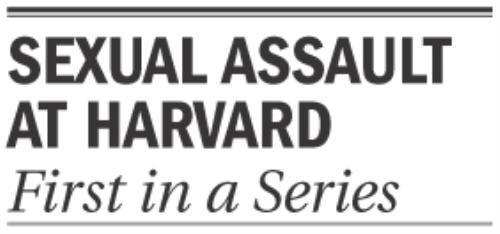
News
Summers Will Not Finish Semester of Teaching as Harvard Investigates Epstein Ties

News
Harvard College Students Report Favoring Divestment from Israel in HUA Survey

News
‘He Should Resign’: Harvard Undergrads Take Hard Line Against Summers Over Epstein Scandal

News
Harvard To Launch New Investigation Into Epstein’s Ties to Summers, Other University Affiliates

News
Harvard Students To Vote on Divestment From Israel in Inaugural HUA Election Survey
Confronting Sexual Assault
The Leaning Committee’s upcoming report should focus on innovative educational and outreach programs

Rape happens at Harvard. Indeed, 58 rapes happened at Harvard last year, according to an extrapolation from the latest University Health Services (UHS) survey. The same survey reports that the total number of sexual assault incidents has increased since last year, as has the number of students who reported being subject to unwanted sexual touching.
In light of the increasing number of reported sexual assaults, and with the campus focused on this issue—last week’s Take Back the Night Candlelight Vigil brought together hundreds of sexual assault survivors and their supporters—the time is ripe for Harvard to take a hard look at the threat that sexual assault poses to its students and how it confronts that threat.
Over the next three days, we will explore three aspects of this problem: education and prevention, health and counseling, and disciplinary and judicial action, and provide suggestions for reform.
The Committee to Address Sexual Assault at Harvard—commonly called the Leaning Committee, after its chair, Assistant Professor of Medicine Jennifer Leaning—is expected to release its findings later this week. The group—which includes students, faculty and administrators—was created last spring by Dean of the College Harry R. Lewis ’68 after students protested a policy that required “independent corroborating evidence” before the Ad Board would hear a sexual assault case. Charged with reviewing “all institutional support services for victims of sexual violence and all preventive, educational, and outreach programs,” the committee has a chance to make a strong impact on Harvard’s policies. While the mandate of the committee has been cautiously drawn to prevent direct changes to discipline procedures, it can still give strong recommendations on education and institute change by presenting the administration with its findings, including dozens of interviews and months of research.
Education is the fundamental starting point to changing the atmosphere on campus. Presently, education about sexual assault at Harvard focuses on the available resources, and does not focus enough on sexual assault itself. Programs that Harvard initiates to educate students must be diverse in both content and method, and must be reinforced during numerous stages of a student’s career. The newly-created position of director of sexual assault prevention services should take a lead role in overseeing the development and constant evaluation of such programs.
But even before student education, Harvard’s top priority is to ensure that every staff member responsible for advising students is fully knowledgeable of the campus’ sexual assault resources. Currently, only a limited number of tutors in the Houses are designated as Sexual Assault/Sexual Harassment (SASH) tutors. This system is clearly inadequate if Harvard wants sexual assault to be an issue that every tutor is prepared to address. At the very least, all tutors, proctors and assistant deans of freshmen, should be prepared with SASH training. These college officials are likely first responders—in most cases, initial interaction is crucial in how a survivor evaluates community support levels and the course of action they pursue.
Available resources must be made absolutely clear to all incoming students. Presently, only a small portion of the Safe Community Night for first-years is devoted to sexual assault. But a larger part of this mandatory student assembly should be devoted to educating students on where students confronted with sexual assault can turn to for help.
Information must also follow students after they leave the Yard. While first-years have emergency contact numbers posted in every room, the practice is inexplicably abandoned when students reach the Houses, where sexual assaults are still a threat. By posting these contact numbers in all rooms, the contact sheet serves as a physical reminder, however subtle, that there are avenues for students to get help.
For upperclass students, more information should be made available about how to deal with sexual assault itself. Take Back the Night Week provides an excellent example of programs that can give students a greater understanding of sexual assault, tools to recognize warning signs in their peers about unhealthy relationships and strategies to confront those whom they think may have been assaulted. The fact that fraternities like Sigma Chi took a prominent role in this year’s awareness events is an encouraging sign that these substantive sessions can attract a broad audience. The budget for these awareness events, such as the educational performance Sex Signals that was held earlier this year, should be increased to sponsor events more frequently and keep sexual assault in prominent focus.
Harvard needs to increase its funding for professional level outreach and training, including giving the College’s peer education groups the tools and training necessary to improve their outreach and counseling.
While these reforms to education are key components of increasing awareness, they are also an important indicator of an institution’s priorities. By increasing and enhancing education, Harvard can send the message that students should devote consistent and sustained attention to sexual assault, and that the University will take a leading role in that effort.
Want to keep up with breaking news? Subscribe to our email newsletter.
